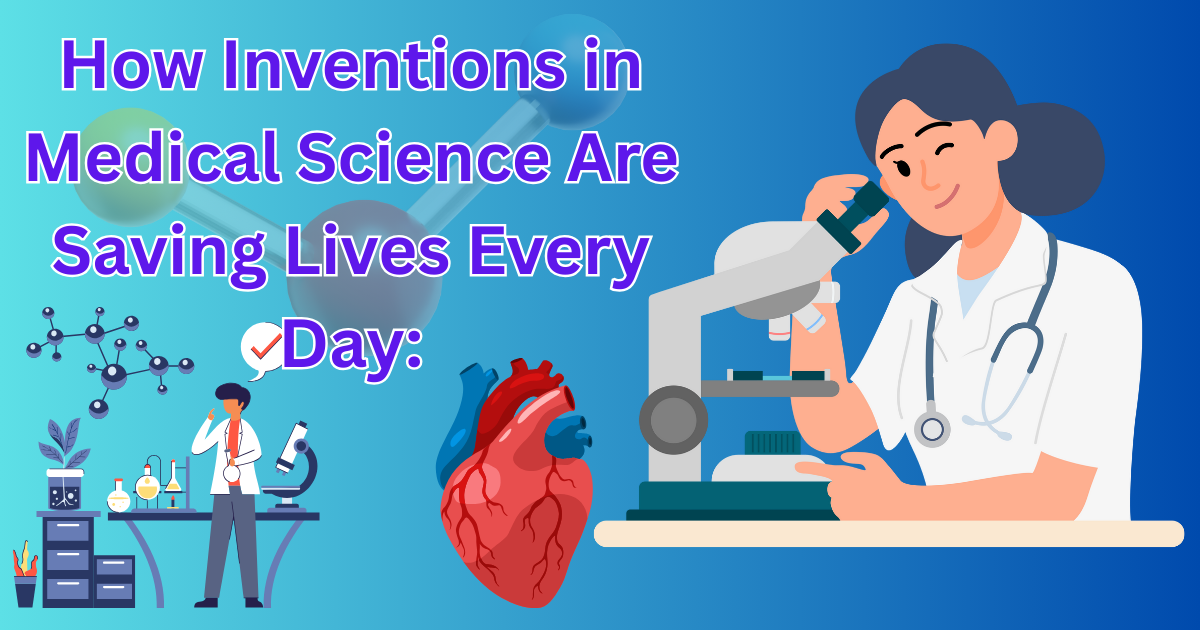How Inventions in Medical Science Are Saving Lives Every Day: It is almost impossible to imagine life without modern medicine and healthcare facilities. However, many of the technologies and procedures we take for granted weren’t even available 100 years ago. By the 20th century, an explosion in new technologies, treatments, and other science-backed practices helped to increase global life expectancy at an unprecedented rate.
How Inventions in Medical Science Are Saving Lives Every Day
Recent years have seen a revolution in the domain of medical science, with groundbreaking discoveries in healthcare as we once knew it. These advances have considerably improved disease diagnosis, treatment, and management, improving patient outcomes and quality of life.

The selection process for identifying the latest advances in medical sciences for this article was as follows. We aimed to showcase groundbreaking developments with the potential to revolutionize healthcare practices and significantly impact patient outcomes. It is a wonderful experience to feel the cold wind blow through our warm body, but without taking the necessary steps, one might become sick and suffer due to it.
The following information indicates some of the scientific innovations that have made life better and safer.
- Spectacles
Spectacles are abundant nowadays, but do you know their inventor’s birthplace remains a mystery? The earliest appearance of wearable glasses emerged in Italy during the 13th century. Several scholars and monks in that era used an initial prototype of present spectacles, which lacked arms. However, with more signs of myopia among people in the later years, it became popular.
- Vaccines
This one almost needs no explanation. According to our beloved MRO communications emails, at least 94.9% of us McGill students are helping make history by getting the COVID-19 vaccine. However, vaccines had squashed some of the most deadly diseases far before the time of coronavirus: polio, smallpox, diphtheria, rubella, and measles, just to name a few.
- Cancer Immunotherapy
This radical new approach targets the cancer patient’s immune system, with one promising strategy involving collecting immune cells and engineering them to produce special cancer-fighting warriors called chimeric antigen receptors. Work has already saved the lives of adults and children with untreatable blood cancers.
- Regenerative medicine
This exciting field of research looks at ways of replacing or generating human tissues and organs when they are damaged. Methods range from stimulating the body’s own repair mechanisms to growing tissues and organs in the laboratory.
- Blood Transfusions
Obviously, innovations like organ transplants and open-heart surgery save lives. But as I’m sure you Grey’s Anatomy fans know. None of these are possible unless you have bags of blood on standby to safely replenish the patient’s life. Our blood carries absolutely everything we need to survive, so it’s no wonder one of the marvels of modern medicine is a way to maintain that life-saving reservoir.
- Organ Transplantation
Now, there is a need for improvements in organ transplantation, and immunosuppressive drugs have increased the success rates of transplants; they are offering a new lease on life to patients with organ failure.
And immunosuppressive drugs have increased the success rates of transplants, offering a new lease on life to patients with organ failure.
- Minimally Invasive Surgery:
Advancements in minimally invasive surgical techniques like laparoscopic and robotic surgery have reduced recovery times, minimized pain, and decreased the risk of complications for patients undergoing surgery.
- Artificial Heart
The heart is one of the most important organs in our body, keeping us alive and transporting blood to various parts of our body. One of the leading causes of death is heart disease. Aside from standard medication and medical treatments, transplants are a great option to combat these statistics.
- The Advancement of Artificial Intelligence in Medicine AI has begun to play an important role in diagnostics, treatment planning, and patient management, offering potential for more accurate and efficient healthcare delivery.
As we reflect on these achievements, it is clear that the medical field has made tremendous progress, improving lives and shaping the future of healthcare.
Conclusion
In this article we discussed how inventions in medical science are saving lives every day: It is almost impossible to imagine life without modern medicine and healthcare facilities. These advances have considerably improved disease diagnosis, treatment, and management, improving patient outcomes and quality of life. The medical field has made tremendous progress.